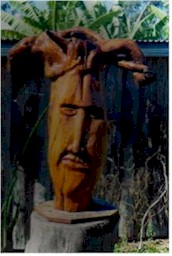|
|
| I Kings 18:26-31: "So they took the bull given them and prepared it. Then they called on the name of Baal from morning till noon. 'O Baal, answer us!' they shouted. But there was no response; no one answered. And they danced around the altar they had made. "At noon Elijah began to taunt them. 'Shout louder!' he said. 'Surely he is a god! Perhaps he is deep in thought, or busy, or traveling. Maybe he is sleeping and must be awakened.'" Psalm 2:4-6: "The kings of the earth take their stand and the rulers gather together against the Lord and against his Anointed One. 'Let us break their chains,' they say, 'and throw off their fetters.' The One enthroned in heaven laughs; the Lord scoffs at them. Then he rebukes them in his anger and terrifies them in his wrath, saying, 'I have installed my King on Zion, my holy hill.'" Matthew 7:3-5: "Why do you look at the speck of sawdust in your brother's eye and pay no attention to the plank in your own eye? How can you say to your brother 'Let me take the speck out of your eye,' when all the time there is a plank in your own eye? You hypocrite, first take the plank out of your own eye, and then you will see clearly to remove the speck from your brother's eye." |
|
| Sometimes we miss the humor in scripture. There's something laughable about a poor fool with a two-by-four protruding out of his eye, groping around half-blind trying to pick some sawdust from his coworker's eye. Humor is almost always dependent on our awareness of a discrepancy. Even the lamest "Knock Knock" joke has this principle behind it:"Knock Knock." "Who's there?" "Harry." "Harry who?" "Hairy toes." | |
| We laugh
(or perhaps groan) because the two parts don't match up, and suddenly, we know why. Satire
is a particular form of comedy, one that exposes and mocks the hypocrisy of human
pretension and folly. Elijah's satire stung the hollow deceptions of the priests of Baal,
painting their god as asleep or distracted or indisposed but finally and actually
non-existent. Satire is not always kind in its humor, but at its best its acerbic bite is
intended to call us on our lies. Sometimes, we need a less-than-gentle laughter to poke
holes in our puffed-up but empty masks. When God scoffs at the rebellious nations, he does
not intend to be cruel. But the discrepancy between our pompous claims and our weak
reality is bound to raise a laugh.
* * * * * Central Insight: Satire is intended to mock evil and thereby warn us against our follies. Suggestions for Application: Discuss how a particular instance of satire makes wrongdoing laughable. |
|
